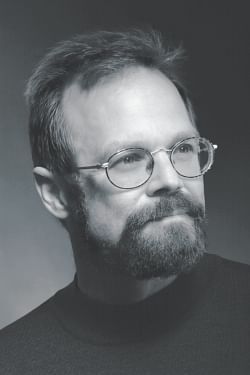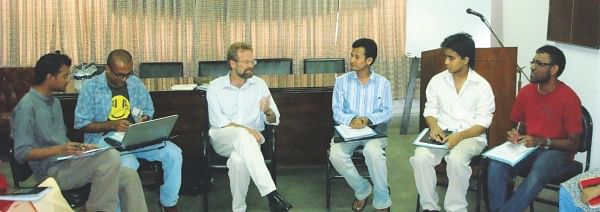| Home - Back Issues - The Team - Contact Us |
 |
| Volume 11 |Issue 25| June 22, 2012 | |
|
|
Interview The Grass of Another Country American poet and journalist Christopher Merrill is known for his four
collections of poetry and several other books of nonfiction and translation.
He discusses the importance of literary translation, principles
of creative writing and his travelling experiences. Akram Hosen
Continuous travel to different continents across the globe ensures that American poet and journalist Prof Christopher Merrill remains jet-lagged much of the time. After spending a week in Vietnam and Cambodia teaching creative writing workshops and giving readings, he came to Bangladesh. During the four days he spent in Dhaka last week, he met Bangladeshi writers, conducted a workshop on creative writing, and gave readings and lectures at different venues in the mornings and evenings. He appeared to be pretty energetic in all the sessions. Merrill has been directing The International Writing Program (IWP) at the University of Iowa since 2000. The programme is a writing residency for international artists in Iowa City. Its primary goal is to introduce talented writers to the writing community at the University of Iowa, and to provide for the writers a period of optimal conditions for their creative work. "When I was invited to rebuild the IWP, I had no idea that it would take so much work to bring the IWP back to life," he says. The administrative job cut into his writing time. However, it is because of his demanding work for the programme that he has "learned to write between meetings and emails, on planes and late at night." Flying to different continents also gives him new places to write about. "I like to think that it gives me a larger perspective about what it means to be alive in our rapidly changing world," he says. Merrill is better known as a poet and non-fiction writer. The subject matters of his books are diverse: apart from four collections of poetry, he has prose books about World Cup Football in Italy, the war in Yugoslavia, monasteries in Greece, and travels in Malaysia, China, and the Middle East. In April 2012, President Obama appointed Merrill to the National Council on Humanities. Merrill directly translates literary texts from French, Old English, and a little bit from Greek. But at IWP, he has also worked on translating from languages that he doesn't know. "I've worked with the writers themselves on translations from Korean and Slovenian--languages I don't speak," he says. In the interactive workshops at his university, writers and translators (including the ones who don't have the source language) always sit side by side and work on translations. "This gives us a chance to ask the writers lots of questions about the work and hope to find an English equivalent for what they have done in their languages," he says, "We recognise the limitations of not knowing the original, but we hope that we may create something new that will honour the spirit of the original." A vibrant literary culture means bringing in works from many different countries. There is always a need for literary translations from as many languages as possible. In fact the literary movement, now known as the Latin American Boom, owes much to some of the best literary translators of the previous century. In Merrill's opinion, it was the gifted translator Gregory Rabassa's translation of Gabriel García Márquez's novel One Hundred Years of Solitude that "helped to fuel the interest in the rest of the world in Latin American writers". He adds that Marquez was lucky in a way to have his entry into the English speaking world through Rabassa. Translating literary texts, particularly poetry, often proves to be the most challenging task for a translator. They face the dilemma of choosing a strategy for translation that can do justice to the source text. Merrill says that his first priority in translating a poem is to make it sound interesting in English. "I search for an equivalent form, and work musical phrase by musical phrase rather than word for word. And I subscribe to Octavio Paz's notion that literal translation is not translation," he says. Since Merrill teaches creative writing around the globe, he has a few suggestions for people who aspire to be writers: "All good writers share certain traits: they read a lot, they write a lot, and they are open to try new things and are not afraid to fail." He also quotes Samuel Beckett, saying, "'Fail again. Fail better.' I always keep that phrase in my mind. When something doesn't work, I always decide to try to fail better next time." In his workshops, he always tries to create an air of experimentation. "I'm throwing out as many ideas as I can about different ways to proceed as a writer," he says. He also introduces participants to the poets who influenced him a lot.
Merrill has also worked as a journalist and a war correspondent in Yugoslavia in the besieged city of Sarajevo. "I always worked as a freelance journalist, so I never had any money but I loved trying to get a story and getting all the facts right and turning it around on dead line," he says. Just as the war came to an end he got a job offer from a college in America. And that led to the current position he has at the IWP. He also worked as a radio journalist for 10 years. But since his main job as the director of IWP is administrative, he doesn't teach that much in the US. "I teach in a lot of countries around the world. For example, I was in Vietnam and Cambodia last week. A lot of my teaching takes place in other lands," he says. Merrill says that there is one school that has been teaching creative writing for about 30 years in Hanoi. Asked to comment on his experience there, he says, "It's very interesting for an American to be in Vietnam." The Vietnamese writers he met were very hospitable to him. "Ever since the sanctions were lifted in 1995, the United States has been growing much closer to Vietnam," he says, "My small effort there with American writers was in the service of finding common ground between the Vietnamese writers and students and American writers." Merrill grew up during the US war in Vietnam. The war ended before he was of age. So he never had to think about fighting on the front. "But my whole childhood was filled with images of the war. So I would say I was shaped by that. It was moving for me now, all these years later, to finally go there and be in dialogue with Vietnamese writers," he says. One of his strongest memories of childhood is about an antiwar protest in his hometown in the late 60s. Coming back to literary translation, Merrill regrets that very few translations of Bangla literary texts are available in English. "As a result, people in the English speaking world know very little about Bangla literature," he says. Nevertheless, he found the works produced by the participants – the members of a group of young writers called Brine Pickles – of the workshop he conducted in Dhaka, extraordinarily interesting. Brine Pickles is the recipient of The American Center’s Small Grant Award 2011-2012. "I feel like I'm getting some sense of life here through the stories that the students were telling in the sessions," he says. Copyright
(R) thedailystar.net 2012 |

